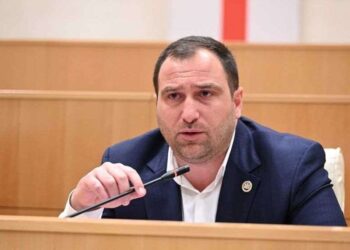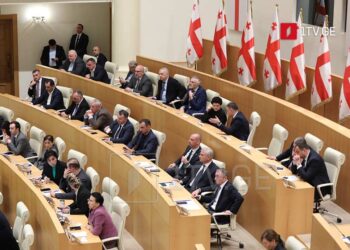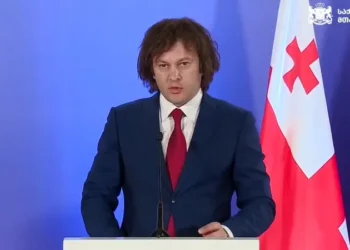What follows is a brief overview of narratives about Georgia in the Russian pro-government media. The review is based on the weekly monitoring of stories on federal channels (Channel One Russia, NTV, etc.), news put out by major online media (Gazeta.ru, RIA Novosti, Russia Today, etc.), and stories shared on more localized online media and Telegram channels.
One of the main narratives encountered daily in the Russian media is US interference in Georgia’s internal affairs. Georgia is traditionally portrayed as a country that, although fighting for independence, invariably falls under the influence of larger states (United States, EU members, third countries). The pro-government media outlets claim that the main goal of the United States is to rig the October 26 elections and organize a “color revolution” that will bring to power a government under its control. The main source of such news is the Russian Foreign Intelligence Service, which, from time-to-time, releases statements about US plans. These statements form the basis of numerous publications and stories on television. Russian government officials, such as the Press Secretary of the Russian President, Dmitry Peskov, also speak about the interference of Western countries, which further contributes to the spread of the discourse. The list of specific claims against the US is constantly growing, and includes the transfer of “hundreds of billions of dollars to support Russophobia,” the training of observers who must, at any outcome, report violations during the elections, the bribery of international organizations, shadow negotiations with the opposition on a new government, etc. Perhaps the most widespread allegation is that there are many NGOs working in Georgia (a total of 30,000, as cited) whose true goal is to serve the interests of the US. USAID and the Soros Foundation are mentioned among such “foreign agents”.
The opening of a “second front” in Georgia for the war with Russia: In justifying the adoption of the Law on Transparency of Foreign Influence, Georgian authorities have, since at least May 2024, been talking about the importance of sovereignty and the risk that the West will open a “second front” in Georgia for the war with Russia. In the summer, the story began to acquire details: the opening of a “second front” was allegedly an unofficial demand of the EU-Georgia negotiations.
The Russian pro-government media has eagerly quoted statements by Georgian Dream members about the “second front,” and published reports that develop this idea. As a result, the possible opening of a “second front” is being referred to by Russian officials, such as the Russian Foreign Minister, Sergey Lavrov.
With the parliamentary elections approaching, this topic has acquired a new aspect: it is now reported that if the opposition wins, it will open a “second front” in Georgia within days. The Russian media in general actively quotes Georgian Dream leaders: half the articles tagged “Georgia” in major online media outlets simply reiterate statements from figures like Irakli Kobakhidze and Bidzina Ivanishvili. Georgian Dream is portrayed as a party that is not particularly sympathetic to Russia, but which cares about the interests of its own citizens (including the right to live in a peaceful country).
Contrasting the “overwhelming majority” of Georgian citizens with the “paid” supporters of European integration: The Russian press seeks to avoid demonizing all Georgian citizens, as it does, for example, in the case of Ukrainian citizens. On the contrary, they create the impression that the overwhelming majority of citizens support the policies of Georgian Dream. These citizens are said to welcome the law On Transparency of Foreign Influence, as they care about the country’s sovereignty, and the law On Prohibition of LGBT Propaganda, since they are very religious and adhere to “traditional values.” A small percentage of young people, they say, fooled by the West or even paid to go to rallies, participate in protests. A popular technique here is to interview a Georgian expert (often, one and the same person gives comments to several media outlets at once), expressing the sentiments of the “ordinary people”.
However, a number of Georgian citizens are portrayed by the Russian media in an unambiguously negative way, particularly the present and former presidents. Of Georgian President Salome Zurabishvili, the Russian pro-government media outlets say she is a “Western agent”, and spread misinformation about her alleged French citizenship. At the heart of this approach was the “Heir Tutti Dolls” show aired on Channel One Russia, one of Russia’s largest federal TV channels. In the nearly hour-long show, every facet of Zurabishvili’s biography was made a cause for accusations: from her foreign education to her wearing of “tasteless jewelry”. Of former President Mikheil Saakashvili, criticism of whom in pro-government media has a long history, dating back to the Georgian-Russian conflict in 2008, they say he is an “American appointee.” Pro-government media allude to his mental illness, and emphasize strange situations involving the ex-president, sharing video footage of him chewing his tie, as well as attempting to contact his team from the roof of a house. When Georgian Dream began attributing responsibility for the events of 2008 to Saakashvili, and expressing a desire for a tribunal against the United National Movement, pro-government media quickly backed this narrative.
Comments are also made about Georgian citizens fighting on the side of Ukraine. Regular reports about mercenaries in the Russian-Ukrainian conflict zone are part of a larger state narrative convincing citizens that Russia is at war not with Ukraine, but with the global West. However, it is the volunteers from Georgia who are regularly mentioned in the pro-government media, seeing them credited with particular brutality. Incorporating the narratives described, the pro-government media outlets claim that most volunteers support Saakashvili, and receive funding from America. However, even in this case, the media seek to emphasize that such people are a minority, that “sensible” citizens of Georgia understand the danger of joining the Ukrainian Armed Forces, and dissuade others from doing so.
Russian pro-government media depict recent developments in Georgia as a conflict between Western forces seeking to undermine the country’s sovereignty and true patriots united under Georgian Dream. The pro-governmental media also aim to suggest that the majority of citizens support government decisions, and that opponents are merely a small, bribed minority.
By the Rondeli Foundation team














